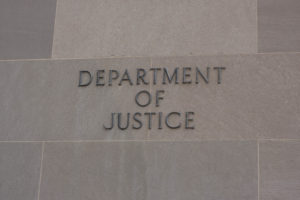By the Constantine Cannon Whistleblower Lawyer Team
Last Wednesday (April 9), the Department of Justice (DOJ) announced that Virginia-based government contractor DynCorp International agreed to pay $21 million to settle charges it violated the False Claims Act by overbilling the State Department under its longtime contract to train Iraqi “CIVPOL” police forces. This is just the latest example of DOJ using the False Claims Act to go after government procurement fraud. It also provides another indication the Trump Administration will continue to vigorously pursue this area of fraud enforcement.
DOJ Claimed DynCorp Passed on Inflated Charges to the State Department
The State Department awarded DynCorp the CIVPOL contract in April 2004 to train civilian police forces in Iraq and provide associated support such as lodging for contractor personnel along with various labor services. According to the government, one of DynCorp’s primary subcontractors charged excessive and unsupported rates for hotel lodging and guard, translator, driver, and supervisor services.
The government claimed DynCorp was aware of these inflated charges (or should have been aware of them) and by passing them through to the State Department, DynCorp violated its obligations as the prime government contractor. The government’s action against DynCorp is notable given it was not DynCorp, but the company’s subcontractor that engaged in and presumably benefitted from the alleged fraud.
But a party can be liable under the False Claims Act for facilitating or otherwise allowing fraud against the government when that party (i) was aware of the fraud or should have been aware with reasonable due diligence, (ii) could have take steps to prevent the fraud, or at least notify the government of it, and (iii) was obligated to take those steps. That is apparently what DOJ found here with DynCorp passing on inflated subcontractor charges to the government.
Government Procurement Fraud Remains a Top Enforcement Priority
Government procurement fraud has always been a top priority under the False Claims Act. In fact, the statute was enacted during the Civil War to go after war profiteers trying to defraud the Union Army. It has remained the government’s primary fraud enforcement tool ever since, especially when it comes to government contractors engaging in fraud or misconduct.
In its 2024 False Claims Act roundup, DOJ highlighted its focus on using the False Claims Act to go after procurement fraud, particularly by defense contractors, stressing this misbehavior “not only squanders government funds, but also can deprive servicemembers of critical resources and potentially put them at risk.” It is a sentiment DOJ reinforced earlier this month with its successful action against a defense contractor for selling the Defense Department military parts that did not meet military specifications.
It is an attitude likewise reflected in the numerous other False Claims Act cases DOJ has brought in the past year against various government contactors for overcharging the government or otherwise failing to comply with their contractual or regulatory obligations. Check out our Top-10 listing for 2024, showing the breadth and scope of the government’s enforcement reach in this area.
DOJ Sends a Message to Government Contractors
The government made a point of using this latest settlement as a warning to all federal contractors to “be fair and honest when doing business with the government,” and that DOJ “will not tolerate those who use times of conflict and strife to enrich themselves at the expense of the American people.”
In announcing the settlement, the government even invoked President Trump and his Administration’s efforts to “zero in on fraud, waste, and abuse,” and take action against “outside entities that are taking advantage of their U.S. government contract by either not providing what they promised or misusing the funds in other ways.” According to Interim U.S. Attorney Edward Martin Jr. for the District of Columbia, “When you are given a government contract, you are taking money from the American people and this office will make certain you deliver on your promises.”
While the Trump Administration has relaxed fraud enforcement in multiple areas – like crypto, climate change disclosures, and foreign bribery, to name a few – with this settlement DOJ seems intent on sending a message that the government will not tolerate military and civilian contract fraud. It remains a staple of the government’s fraud enforcement regime.
Constantine Cannon whistleblower partner Gordon Schnell noted, “The DynCorp settlement is another strong indication that regardless of what other changes the Trump Administration is bringing to regulatory enforcement, it is still committed to prosecuting classic contractor fraud.” In fact, in his recent OpEd piece in The Hill, Schnell writes that President Trump has “presaged a prominent place for whistleblowers in his current political playbook” using the powerful tool the False Claims Act provides.
Constantine Cannon Has Significant Experience Representing Procurement Fraud Whistleblowers
It does not appear a whistleblower was involved in the DynCorp action. However, whistleblowers typically originate False Claims Act cases. The qui tam provisions of the statute allow private parties to bring these cases on behalf of the government and in return share in any government recovery (up to 30%). Whistleblowers have recovered billions of dollars in awards over the past thirty years by originating these kinds of cases.
Constantine Cannon has substantial experience representing procurement fraud whistleblowers under the statute. In one of our most recent successes in this area, we represented the whistleblower who secured a record settlement against several Wall Street banks for allegedly engaging in widespread fraud and collusion in their government contracts to market and price certain municipal bonds.
In another recent record procurement fraud settlement, the firm represented two whistleblowers against KBR Services, alleging the defense contractor overcharged the government in connection with its multi-billion contract to support the US military in Iraq.
In both cases, our whistleblower clients received awards of close to 30% of the government’s recovery, the maximum award permitted under the statute.
If you have information relating to potential procurement fraud, would like more information on what it means to be a whistleblower, or would like to learn more about Constantine Cannon’s whistleblower successes, please don’t hesitate to contact us. We will connect you with an experienced member of the Constantine Cannon whistleblower team for a free and confidential consultation.
Read DOJ Shows Continued Commitment to Use False Claims Act to Target Procurement Fraud at constantinecannon.com






Leave A Comment